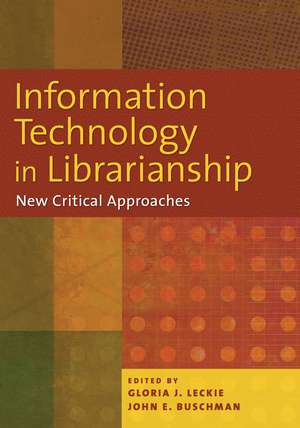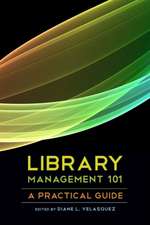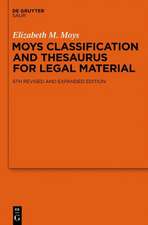Information Technology in Librarianship: New Critical Approaches
Editat de Gloria J. Leckie, John E. Buschmanen Limba Engleză Paperback – 29 noi 2008 – vârsta până la 17 ani
Preț: 321.01 lei
Preț vechi: 391.73 lei
-18% Nou
Puncte Express: 482
Preț estimativ în valută:
61.42€ • 64.14$ • 50.72£
61.42€ • 64.14$ • 50.72£
Carte tipărită la comandă
Livrare economică 15-29 aprilie
Preluare comenzi: 021 569.72.76
Specificații
ISBN-13: 9781591586296
ISBN-10: 1591586291
Pagini: 304
Dimensiuni: 156 x 235 x 25 mm
Greutate: 0.48 kg
Editura: Bloomsbury Publishing
Colecția Libraries Unlimited
Locul publicării:New York, United States
ISBN-10: 1591586291
Pagini: 304
Dimensiuni: 156 x 235 x 25 mm
Greutate: 0.48 kg
Editura: Bloomsbury Publishing
Colecția Libraries Unlimited
Locul publicării:New York, United States
Notă biografică
Gloria J. Leckie is LIS program coordinator, University of Western Ontario, London, Ontario, Canada. She attained her MLIS and her PhD from the University of Western Ontario. Her research interests include information seeking behavior, the work of scholars and professionals, academic librarianship, information technologies, information literacy and libraries as public space. Gloria is currently on the Board of the Canadian Association for Information Science as well as on the Editorial Boards of the Journal of Academic Librarianship and the Canadian Journal of Information and Library ScienceJohn E. Buschman is associate university librarian, Collections, Preservation & Scholarly Communication, Lauinger Library, Georgetown University, Washington, DC
Cuprins
Introduction: Information Technologies and Libraries--Why Do We Need New Critical ApproachesPart One: Foundations Chapter 1: Critical Theory of Technology: An Overview Chapter 2: Surveillance and Technology: Contexts and Distinctions Chapter 3: Cycles of Net Struggle, Lines of Net Flight Chapter 4: A Quick Digital Fix? Changing Schools, Changing Literacies, Persistent Inequalities: A Critical, Contextual Analysis Chapter 5: Theorizing the Impact of IT on Library-State RelationsPart Two: Applications Chapter 6: The Prospects for an Information Science: The Current Absence of a Critical Perspecitive Chapter 7: Librarianship and the Labor Process: Aspects of the Rationalization, Restructuring, and Intensification of Intellectual Work Chapter 8: "Their Little Bit of Ground Slowly Squashed into Nothing": Technology, Gender and the Vanishing Librarian Chapter 9: Children and Information Technology Chapter 10: Open Source Software & Libraries Chapter 11: Technologies of Social Regulation: An Examination of Library OPACs and Web Portals Chapter 12: Libraries, Archives and Digital Preservation: A Critical OverviewConclusion: Just How Critical Should Librarianship Be of Technology?IndexAbout the Editors and Contributors
Recenzii
.The new edition, subtitled New Critical Approaches, examines six types of critiques, among them feminist technology analysis and technological utopia, in a series of chapters by prominent scholars. Required reading for anyone interested in critical theory relating to technology.
Because this volume focuses on the issues and implications connected to technology, it will be accessible and useful for readers who are already familiar with critical discussions of technology as well as readers who are new to the conversation. . . . Because of the complexities and interconnections for each of the chapters, the volume as a whole is stronger than any of its individual parts. The individual sections and chapters, however, are also of considerable merit albeit on the more local level addressed in each. Any of the components, especially if supplemented by the introduction and conclusion, would be excellent reading for both students and professionals.
In this second edition of the 1993 classic, the authors present an insightful and thought-provoking sequel on information technology in librarianship from a critical perspective. . . it is in Part II that the practical application of information technology will be of interest to most readers.
.will interest librarians, as well as those in government, industry, research, and education.
Although it may appear that this book is aimed at academics and researchers in the field of information and library science, as well as practising librarians, anyone with an interest in the impact of technologies on society should find a number of relevant chapters and passages in this volume. An example is Chapter 9 about children and information technology that should be of interest to parents and teachers.
Because this volume focuses on the issues and implications connected to technology, it will be accessible and useful for readers who are already familiar with critical discussions of technology as well as readers who are new to the conversation. . . . Because of the complexities and interconnections for each of the chapters, the volume as a whole is stronger than any of its individual parts. The individual sections and chapters, however, are also of considerable merit albeit on the more local level addressed in each. Any of the components, especially if supplemented by the introduction and conclusion, would be excellent reading for both students and professionals.
In this second edition of the 1993 classic, the authors present an insightful and thought-provoking sequel on information technology in librarianship from a critical perspective. . . it is in Part II that the practical application of information technology will be of interest to most readers.
.will interest librarians, as well as those in government, industry, research, and education.
Although it may appear that this book is aimed at academics and researchers in the field of information and library science, as well as practising librarians, anyone with an interest in the impact of technologies on society should find a number of relevant chapters and passages in this volume. An example is Chapter 9 about children and information technology that should be of interest to parents and teachers.





